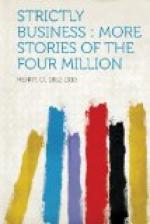“Right!” said Merritt. “Now, run your eye down that bill of fare and see if it seems to hitch on any of these items.”
“Lay me on my lava bed!” said Greenbrier, with bulging eyes. “All these specimens of nutriment in the grub wagon! What’s this? Horse with the heaves? I pass. But look along! Here’s truck for twenty round-ups all spelled out in different directions. Wait till I see.”
The viands ordered, Merritt turned to the wine list.
“This Medoc isn’t bad,” he suggested.
“You’re the doc,” said Greenbrier. “I’d rather have whiskey straight. It’s on you.”
Greenbrier looked around the room. The waiter brought things and took dishes away. He was observing. He saw a New York restaurant crowd enjoying itself.
“How was the range when you left the Gila?” asked Merritt.
“Fine,” said Greenbrier. “You see that lady in the red speckled silk at that table. Well, she could warm over her beans at my campfire. Yes, the range was good. She looks as nice as a white mustang I see once on Black River.”
When the coffee came, Greenbrier put one foot on the seat of the chair next to him.
“You said it was a comfortable town, Longy,” he said, meditatively. “Yes, it’s a comfortable town. It’s different from the plains in a blue norther. What did you call that mess in the crock with the handle, Longy? Oh, yes, squabs in a cash roll. They’re worth the roll. That white mustang had just such a way of turning his head and shaking his mane—look at her, Longy. If I thought I could sell out my ranch at a fair price, I believe I’d—
“Gyar—song!” he suddenly cried, in a voice that paralyzed every knife and fork in the restaurant.
The waiter dived toward the table.
“Two more of them cocktail drinks,” ordered Greenbrier.
Merritt looked at him and smiled significantly.
“They’re on me,” said Greenbrier, blowing a puff of smoke to the ceiling.
X
THE UNKNOWN QUANTITY
The poet Longfellow—or was it Confucius, the inventor of wisdom?—remarked:
“Life is real, life is earnest;
And things are not what they seem.”
As mathematics are—or is: thanks, old subscriber!—the only just rule by which questions of life can be measured, let us, by all means, adjust our theme to the straight edge and the balanced column of the great goddess Two-and-Two-Makes-Four. Figures—unassailable sums in addition—shall be set over against whatever opposing element there may be.
A mathematician, after scanning the above two lines of poetry, would say: “Ahem! young gentlemen, if we assume that X plus—that is, that life is real—then things (all of which life includes) are real. Anything that is real is what it seems. Then if we consider the proposition that ‘things are not what they seem,’ why—”




